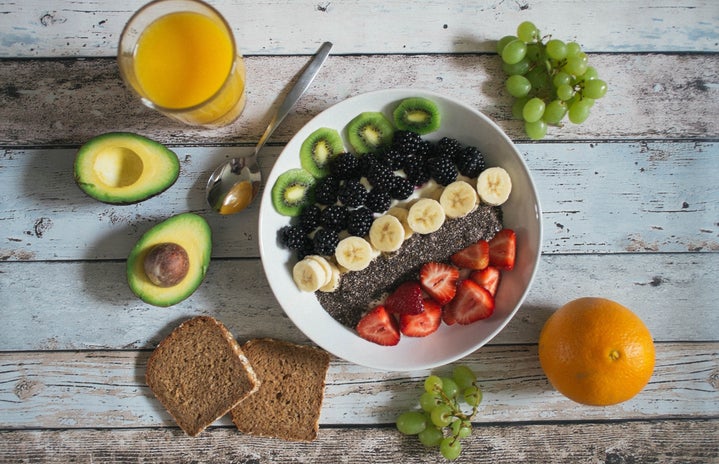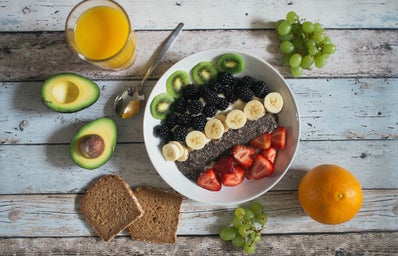University life means different things to different people. For all of us, it involves new experiences, whether that be a new city, new people, or new subjects. For others, it may be the first time they have to take care of themselves in ways they didn’t have to before; namely, being able to cook.
I was lucky enough to be taught how to cook and bake from an early age, but for some, starting university means takeout, ramen, and mooching off of your friends. For those of you who are pretty new to cooking, or even those who aren’t, I’ve put together a list of cooking tips that will hopefully help you bridge the gap from total cooking novice to someone who can make a tasty stir fry.
Help! I’ve added too much ______!
Salt
Over-salting dishes is a common mistake. Obviously, your first course of action is to season lightly and taste often. But, if you’ve already done the damage, there are a few remedies you can try to fix your situation without starting again from scratch. Depending on what it is you’re cooking, there are a number of possible solutions. If you’re making a soup or something with a lot of liquid, you can add a starch. Starches, like rice and potatoes, tend to be quite bland and can help add more volume to your dish without adding too much extra flavour. Unfortunately, not all meals work with added rice or potatoes. In other cases, try adding more liquid to dilute the flavour. Water will generally dilute the other flavours you want too much, so it’s better to try something that complements your dish, like low-sodium broth, tomatoes, or cream.
Sugar
Sometimes dishes call for a little dash of sugar, and when you add too much, it can make your main course taste like some weird pseudo-dessert. In this case, we’re trying to find something that will counter the sweet flavour. If you’re thinking of adding salt, think again. While sweet and salty might be a flavour that works for some dishes, it won’t enhance them all. You’re probably better off adding something more acidic, like balsamic vinegar, lemon/lime juice, or tomatoes.
Acidity
Meals can become too acidic a lot of ways: you may have been a little heavy-handed with the lemon juice, or maybe that can of diced tomatoes was just extra intense. Either way, there are two good fixes for this problem. First, you can do the opposite of what we talked about in the last tip: use sugar! If acidity helps counter too much sugar, then some sugar can help counter too much acidity. Also, as weird as it sounds, baking soda is actually my favourite tip for this problem. Of course, this works best when you’re making a soup or a sauce, but adding a pinch of baking soda can neutralize the acidity of your dish. We all remember high school chemistry, right? Even though this works best in a liquid, I actually used this in some pad thai I made recently and it really helped. Make sure you add little by little, though—you definitely don’t want to go overboard with this!
Spice
I am reeeeally not good when it comes to heat. I find it’s better for me to just leave it out completely, but for most people, a little spice is nice. If you overdo it with the chilis, though, adding something creamy or bland can really help you out. Depending on what you’re making, milk, cream, yogurt (and their non-dairy alternatives), and starches are your best bet.
Overcooked pasta
Personally, I’m not a fan of al dente pasta, but I do know that it’s a hell of a lot better than overcooked pasta. While this tip isn’t great if you’re serving a bunch of people, it can be helpful when you’re cooking for one (or two). Sauteeing your overcooked pasta with a little oil will help firm in up around the edges, but this method is only really effective if you don’t crowd the pan. If you add too much pasta, you’ll have to stir it around a lot, which will just end up with your pasta breaking and becoming a sad, mushy mess.
DIY breadcrumbs
There is no reason—and I mean no reason—to spend your hard-earned student loans on breadcrumbs. Also, because we all love Community Cabbage, we know that food waste is a big no-no. No one likes the ends of bread loaves, so a great way to make the most of them is to freeze them and blend them into breadcrumbs! You can store them frozen for months in the freezer and add them directly to food when you need it.
Thin soups and sauces
Trying to make a stew and it’s turning out more like a broth? No problem: just mix one or two teaspoons of cornstarch with equal parts water and pour that into your soup. Make sure your cornstarch mixture is smooth and not clumpy before you add it to your meal. Keep stirring, and in a minute or two, you’ll see it start to thicken up. Make sure you give this one time before adding any more, as it can take a couple minutes to work.
What the heck is buttermilk?
Buttermilk is basically what’s left after milk is churned into butter and it gets all fermented and tangy. Sounds good, right? Unless a recipe specifically calls for it, chances are it’s not on your grocery list. Instead of running out to the store to get something you probably won’t use up, making a substitute is super easy. Just add one teaspoon lemon juice or vinegar to one cup of milk, let it sit for 2–3 minutes, and voila! Just make sure after those 2–3 minutes, you add it to your recipe right away—you don’t want to leave it thickening for too long!
And with that, you’re a few steps closer to becoming Gordon Ramsay. Well . . . maybe not. But at least you’re one step closer to becoming a real adult, and that’s just as good. What are you going to cook next? Let us know!


